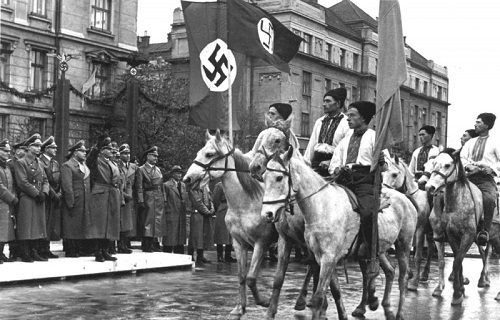
Ukrainian Priests at War Criminals’ Service
Nadia Bazuk (Editor – Russian and Ukranian Orthodox Affairs) OCP News Service- 22/2/2020
The Orthodox Church of Ukraine and the Ukrainian Greek Catholic Church honor the veterans of the Waffen-SS Galizien (Halychyna) Division and the Ukrainian Nachtigall Battalion of the German Abwehr.
World War II ended almost 75 years ago. The world reviewed the results of this historical catastrophe a long time ago by dividing its participants into those sections, namely who were criminals of war and those who opposed them.
Those who supported Nazis to destroy and enslave peoples of Europe were Ukrainian nationalists. It should be mentioned that collaborations took place in all nations that fought against Hitler. Because of numerous historical factors, it was Western Ukraine where Nazis gained the biggest support.
Ukrainian nationalists have always been encouraged and spiritually nourished by the Ukrainian Greek Catholic Church (UGCC). Bishops Josyf Slipyj and Nykyta Budka held services for the Waffen-SS Galizien (Halychyna) Division which, according to the Polish Institute of National Remembrance, committed lots of war crimes including the massacre of 868 Polish citizens in Huta Peniacka. UGCC Metropolitan Archbishop Andrey Sheptytsky of Galicia personally sent chaplains to the division to improve the soldiers’ morale. Although in 1941 Met. Sheptytsky along with the Ukrainian Autocephalous Orthodox Church Bishop Polycarp Sikorsky of Lutsk supported nationalists’ attempt to declare an independent Ukrainian state with the help of the Third Reich. However, he didn’t urge Ukrainians to join the Waffen-SS Galizien Division or the Ukrainian Insurgent Army (UPA) led by Roman Shukhevych, Stepan Bandera’s associate. Bandera’s Organization of Ukrainian Nationalists (OUN), of whose members the Nachtigall Battalion, formed in 1940, was responsible for the Jewish pogrom in Lviv in 1941 and urged to kill the “Polacks, Jews, and communists.”
According to the OUN’s main doctrine, the highest priority was fighting against the Polish people and Bolsheviks, and only after that – “passive efforts” against Nazis. Shukhevych supposed that after the war the Polish could lay claim to Galicia and Transcarpathia and carry out ethnic cleansing of the Polish population. One of the most famous ethnic cleansings was the Volhynian slaughter, during which OUN soldiers killed more than 60 thousand Polacks including women and children.
After the Volhynian slaughter, Metropolitan Sheptytsky wrote to Roman Catholic Archbishop Boleslav Twardowsky of Malopolska (who was in charge of the Lviv Archdiocese0 that murders of Polacks were the consequence of murders of Ukrainians and were committed by “gangs and runaways wanting to retaliate.”After the Soviet Army entered Lviv, Sheptytsky wrote a letter to Joseph Stalin praising him and thanking for the consolidation of the Western Ukraine regions.
Regrettably, within decades of independence, Ukrainians have failed to accept and overcome the past by going beyond colonialism and nationalism. Nowadays religious situations in Western Ukraine provide no clear alternative – everything is still complicated and controversial. UGCC Major Archbishop Svyatoslav Shevchuk claims that Metropolitan Sheptytsky never supported the SS army and German Nazis but equally deserves the title Righteous Among the Nations. Simultaneously, UGCC Archbishop-Metropolitan Volodymyr Viytyshyn recently performed a funeral service for the last combatant of an SS division in Ivano-Frankivsk, whose funeral was attended by people in SS uniform.
Members of the Orthodox Church of Ukraine also demonstrate their adherence to the ideas of the Bandera nationalism. The Church’s Primate Epiphanius not long ago said he was contented to be called a Banderist. But it was Bandera’s ideas which led to massacres of Jews in Lviv by the Nachtigall battalion and the slain of Polacks by the OUN (during the Volhynian slaughter). Metropolitan Epiphanius is backed by OCU clergymen who sang the song “Bandera is our father, Ukraine is our mother” during Christmastide. Stepan Bandera was commemorated by an OCU bishop Viktor Bed who served a lithia memorial service on the occasion of the 111th anniversary of the birth of the 20th-century Ukrainian nationalism’s ideologist. Also, in August 2019, Metropolitan Epiphanius and UGCC Major Archbishop Svyatoslav Shevchuk consecrated an OUN-UPA fighters monument set up in a Jewish cemetery near Lviv. Ironically, Jews massacred during the pogrom of 1941 carried out by the Nachtigall battalion are buried in the same cemetery.
Concerns about Nazi associates have been repeatedly expressed by Polish and Israeli diplomats. However, the UGCC and OCU are however trying involving President Vladimir Zelensky in promoting their dubious views on history and ideology. Such attempts are somehow successful. The President called on the necessity to form a positive perception of Ukraine in the world, to urge the Ukrainians to discover their identity in themselves, in their diversity and achievements, encounters obstacles in internal policy and nationalist organizations exploited by various political powers in their struggle. It is doubtful whether the UGCC and OCU hierarchs don’t understand: Vladimir Zelensky’s support of such ambiguous figures like Stepan Bandera, Andrey Sheptytsky or Josyf Slipyj. By supporting these Churches, will end his equidistant attitude to all confessions. Stepping on the path of the nationalist discourse, accepting the expectations of Bandera followers, the young leader would be tied by them and wouldn’t be capable to come out.
Source:
OCP News Service

